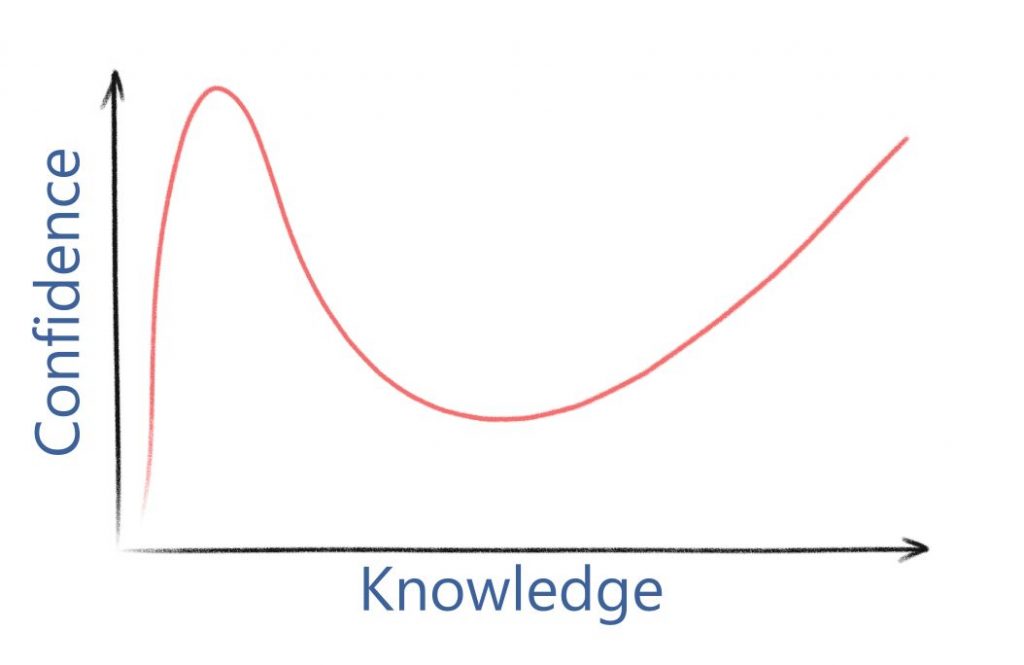The Dunning-Kruger Effect
What is it and how does it impact your business?
- Bertrand Russell (1951)
The chart you've probably seen
The Dunning-Kruger effect is a cognitive bias where people with low ability in a particular task tend to overestimate their skill level, while those with higher ability tend to underestimate their skill level. This bias occurs because individuals with low ability often lack the knowledge and experience necessary to recognize their own mistakes or limitations, leading them to have a false sense of confidence in their abilities. On the other hand, those with high ability tend to have a better understanding of the complexity of the task and therefore are more aware of the gaps in their knowledge and skills. The Dunning-Kruger effect can have significant implications in various areas, such as education, work, and public policy.
The Dunning-Kruger effect is often shown accompanied by a chart that strongly overexaggerates the effect, it's a chart you've probably seen but can't remember its name, something in the likes of the below:

While this chart has nothing to do with the actual study that is behind the forementioned effect, and got washed out when being posted all over social media, it perfectly gets the gist of the topic: people with low knowledge, think that they know more, and/or are more skilled and/or have better performance etc. since they do now know the full spectrum of the topic. On the other hand, when people get to know the topic a little bit better, they don't overestimate their abilities as much.
The chart you probably haven't, but should have seen
That above chart is a fun depiction of the topic, but for the sake of science, lets take a look at the actual charts from the study:

source: Ehrlinger J, Johnson K, Banner M, Dunning D, Kruger J. Why the Unskilled Are Unaware: Further Explorations of (Absent) Self-Insight Among the Incompetent. Organ Behav Hum Decis Process. 2008 Jan 1;105(1):98-121. doi: 10.1016/j.obhdp.2007.05.002. PMID: 19568317; PMCID: PMC2702783.
How can this impact your business?
So now we know that people tend to overestimate their abilities, how can this impact your business?
Firstly, if individuals within the organization are affected by the Dunning-Kruger effect, they may overestimate their abilities in certain areas, which could lead to poor decision-making and suboptimal outcomes. For example, a manager who lacks the necessary skills and experience in a particular area may believe that they are fully capable of making decisions in that area, leading them to make poor decisions and potentially harm the business.
Secondly, the Dunning-Kruger effect can also affect the behavior of employees and their interactions with each other. Individuals who overestimate their abilities may be less likely to seek feedback or input from others, which could lead to a lack of collaboration and cooperation within the organization. This could ultimately impact the overall performance of the business.
Qlik Sense has a community of over 200,000 users worldwide who actively share their knowledge and expertise with each other. Qlik Community is an online platform where users can connect with each other, ask and answer questions, share tips and tricks, and even contribute to the development of Qlik Sense through open-source projects.
Fact-based decision-making instead of opinion-based

So if people tend to overestimate basing on their own knowledge, how can you minimize this effect?
In general, having more data can help mitigate the impact of the Dunning-Kruger effect, as it provides a more objective basis for decision-making and can help individuals better recognize their limitations and areas for improvement. However, even with limited data, it's important for businesses to foster a culture of self-awareness and open communication, which can help individuals better recognize and address their own biases and limitations.
Data can provide an objective basis for decision-making. By using data to inform decisions, individuals can rely on more objective and reliable information rather than their subjective beliefs or assumptions. This can help minimize the impact of the Dunning-Kruger effect by providing a reality check for individuals who may be overconfident in their own abilities.
Data can also reveal gaps in knowledge and skills. When individuals are confronted with data that contradicts their assumptions or beliefs, it can highlight areas where they may be lacking in knowledge or skills. This can help individuals recognize their own limitations and work to improve their skills or seek out additional resources.
Fact-based decision-making can encourage collaboration and feedback. By relying on data and objective information, individuals may be more open to collaboration and feedback from others. This can help individuals recognize and address their own biases and limitations and improve their decision-making skills over time.
Qlik Sense as a fact-based decision tool
Qlik Sense is a business intelligence and data analytics software that can help organizations make fact-based decisions by providing powerful data visualization, analysis, and reporting capabilities. Here are some ways that Qlik Sense can help in fact-based decision-making:
- Data visualization: Qlik Sense offers an intuitive and interactive interface for visualizing data, allowing users to easily explore and analyze complex datasets. By representing data visually, users can identify patterns and trends that may not be immediately apparent from raw data, which can help inform fact-based decision-making.
- Data analysis: Qlik Sense provides powerful data analysis capabilities, including data modeling, data blending, and data discovery. Users can quickly explore data from multiple sources, and Qlik Sense's built-in machine learning algorithms can help identify correlations and outliers in the data, which can provide valuable insights for decision-making.
- Collaboration: Qlik Sense allows users to share data, visualizations, and insights with others in the organization, which can encourage collaboration and facilitate fact-based decision-making. Users can also create and share custom apps and dashboards, which can help ensure that everyone in the organization is working from the same data and insights.
- Real-time data: Qlik Sense can connect to a variety of data sources, including real-time data streams. This allows users to monitor key metrics in real-time, which can help inform quick and fact-based decision-making.
Overall, Qlik Sense can help organizations make fact-based decisions by providing powerful data visualization, analysis, and collaboration capabilities that can help users explore and understand complex data.